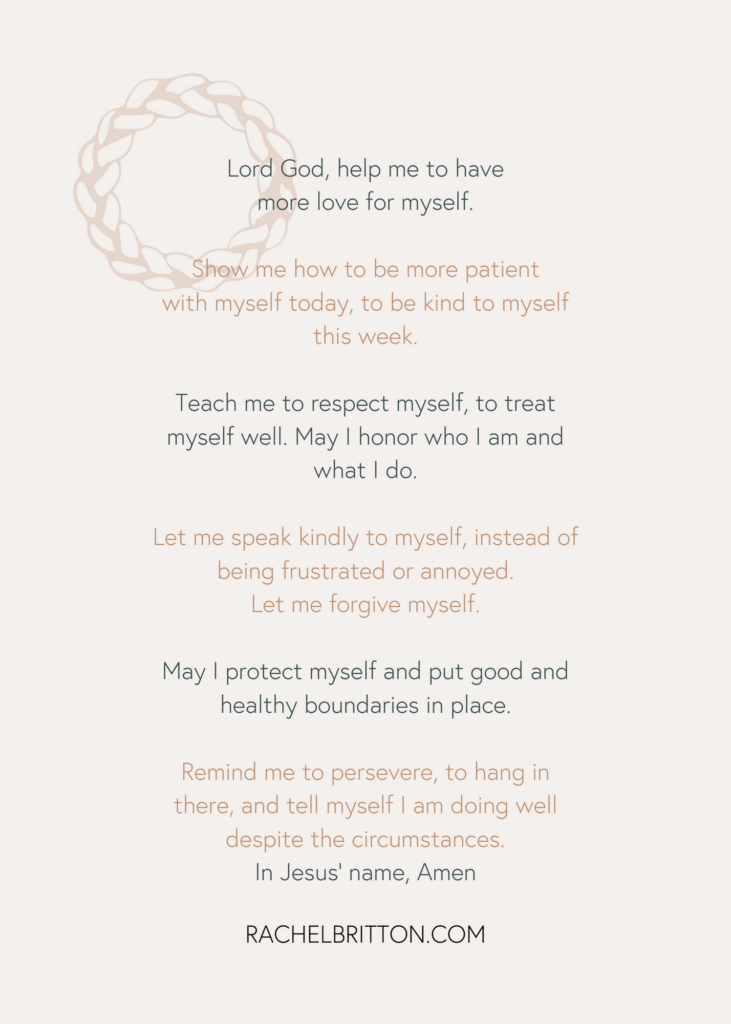The Bible has plenty of teachings about love. We are to love God with all our heart, soul and strength (Deuteronomy 6:5). We are to love our neighbor (Mark 12:33). We are to love foreigners, those who are not like ourselves, and strangers (Deuteronomy 10:19). We are even to love our enemies (Matthew 5:44)! And then 1 Corinthians 13 has a tall order of what love looks like.
But the one instruction about love that I think we often miss is, we are to love ourselves (Mark 12:30-31).
Loving ourselves can seem like a step in the wrong direction. If we love ourselves too much then we are likely to become prideful, selfish, vain. The Bible tells us to think of others more than we think of ourselves. If we love ourselves, we may end up putting ourselves first, before others.
But, the instruction, or rather the expectation is that we do love ourselves. It’s right there in Mark 12 “Love your neighbor as yourself.”
The question that follows in my mind is: If I don’t love myself sufficiently, do I find it hard to love other people just as adequately? This seems where a problem comes in—if we don’t love ourselves how do we love others?
So how do I love myself?
How does the Bible expect you and I to love ourselves?
Sometimes we are our worst critics. Much harder on ourselves than other people are on us. And much harder, may I say, on how God is on us.
The Bible says that God loves you even though you mess up, make mistakes, and do things far worse than that—ignore him and his goodness and graciousness. Throughout all your failings, God loves you.
This is real love—not that we loved God, but that he loved us and sent his Son as a sacrifice to take away our sins (1 John 4:10 NLT).
Often we berate ourselves for the mistakes we have made, not just once but again and again. We fail to let go of things we did years ago. We tell ourselves we are stupid enough to make the same blunder again and again.
Yet, God forgives and forgets. His mercy is always readily available and given out again and again.
God is sheer mercy and grace; not easily angered, he’s rich in love. He doesn’t endlessly nag and scold, nor hold grudges forever. He doesn’t treat us as our sins deserve, nor pay us back in full for our wrongs. As high as heaven is over the earth, so strong is his love to those who fear him. And as far as sunrise is from sunset, he has separated us from our sins (Psalm 103:8-12).
We, however, can’t forgive ourselves. We fail to move on.
We may even know the failings of others but we don’t usually let those faults define them. Yet at the same time, we are hard on ourselves.
Maybe we should take the instructions about love in 1 Corinthians 13 and apply them to ourselves?
Love is patient, love is kind… It does not dishonor others… it is not easily angered, it keeps no record of wrongs. It always protects, always trusts, always hopes, always perseveres.
“Love is…”
Pick one of the “love is …” statements from the list above and make it a gift to yourself. Make it something you can work on.
Where do you need to be more patient with yourself today?
How can you be kind to yourself this week?
How can you respect yourself?
How can you treat yourself well?
How can you be satisfied with yourself and honor yourself?
How can you speak well to yourself, instead of being frustrated or annoyed?
Where do you need to forgive yourself?
How do you need to protect yourself, to put boundaries in place?
Where do you need to persevere with yourself? To hang in there? To tell yourself you are doing well despite the circumstances.
Then, wait to see how it helps you to be patient, kind, and more with other people.
Pray

Photo by Helena Lopes on Unsplash

